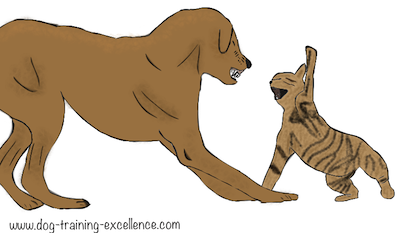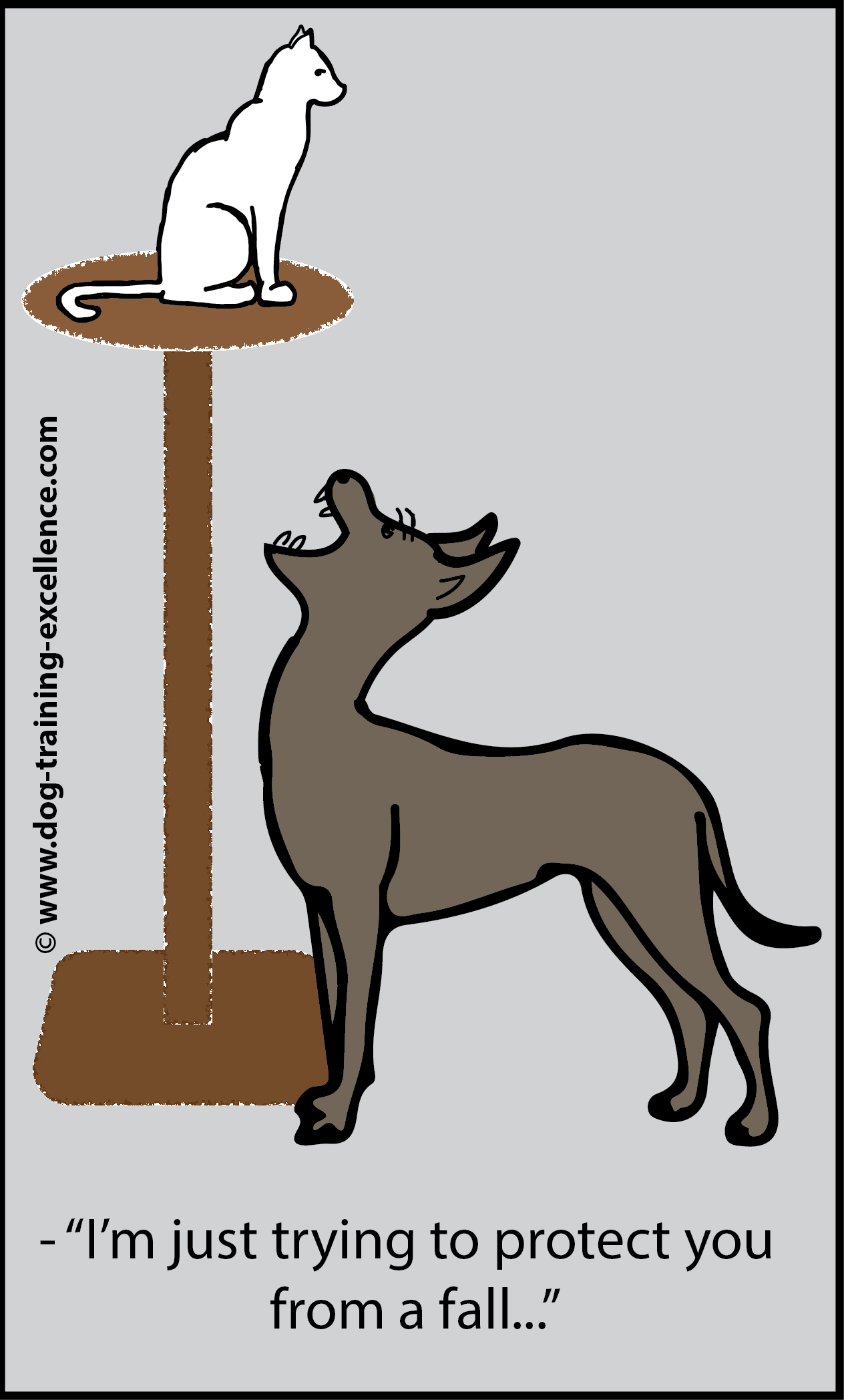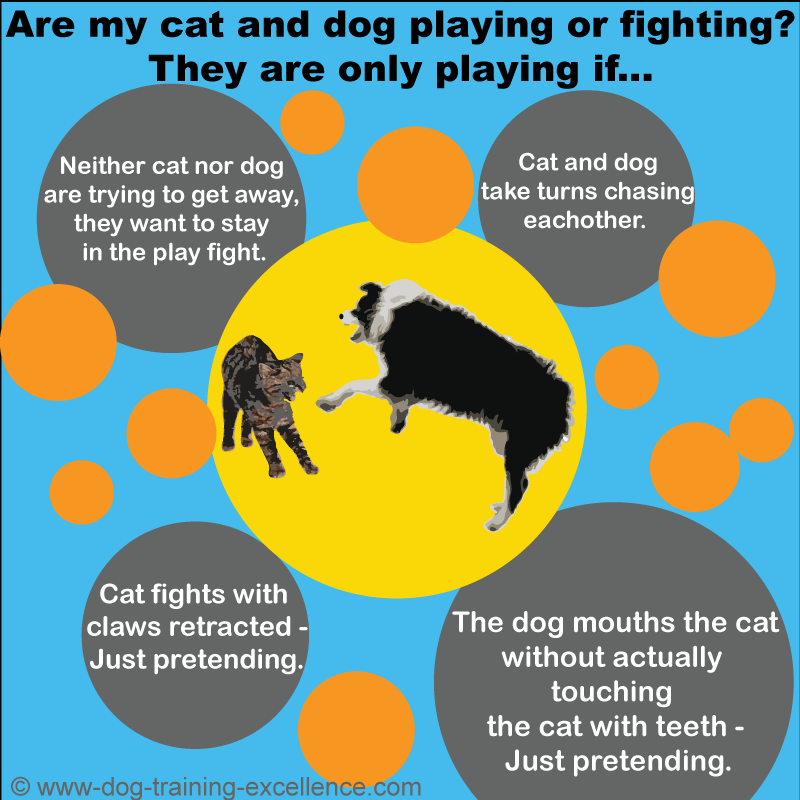I try to write my posts as unbiased as possible and recommend the products I consider to be useful and the best. I use affiliate links, this means that–at no extra cost to you–I can make a commission on a purchase you make after clicking on them. As an Amazon Associate I earn from qualifying purchases.
My cat and dog fight,
how do I stop it?
Do your cat and dog fight often? In this article, you will learn how to distinguish if your cat and dog are playing or just fighting, why your pets might engage in aggressive interactions and how to stop them.
I will teach you how to train your dog to leave the cat in peace (or vice versa) while at the same time training your cat to "love" your dog (or vice versa!).
Your first reaction is to scold the animal that is bothering the other pet, right? Unfortunately, this will only make things worse. Your pets are already stressed about the new situation and your yelling will not help them relax.
Because this is an aggression problem, I highly recommend you get the help of a professional behaviorist in your area. Seeing an animal trainer in action sometimes tells you more than a hundred words could.
Cat and dog fight tips
Teach your dog obedience: This website is full of information and step-by-step guides to help you train your puppy with positive methods. Use this information now if you haven't already! Start by learning about training methods and then teach your dog basic commands. It's easy and fun!
Learn about cats and dogs: This article will tell you about the main differences between cats and dogs. This information will help you deal with specific problems that each species have.
Introducing dogs and cats: This article details how to properly introduce canines and felines. Even if your pets already know (and hate!) each other, read this article which has useful information that you will be able to use right now.
Give each animal a safe place: Get a cat-tree or give your feline access to a high shelf for safety. Make sure this place has an escape. You don't won't a dog waiting, all day long, down below with its mouth open! For your dog, get a crate and set it in a different room. Cats are not allowed in this room and NEVER inside the dog's crate. Each space must be sacred for each animal.
Understanding why your cat and dog fight
Next you need to observe your pets and figure out why your dog and cat fight. Here are a few common reasons to get you started:
- The hound likes to chase the cat, even if it is for play, this makes the feline stressed and provokes her.
- The puppy wants to play fight with the cat. Again, the cat might not be interested or even be scared and react poorly. And vice-versa, the kitten wants to play with the dog. He doesn't like it or is scared and reacts aggressively.
- Dogs and cats communicate with the body in different ways. One common example is tail wagging. For dogs, it means I am happy, I want to play! For cats, it means I am stress and if you move closer things will go bad. This is a more subtle problem. Learn about canine body language and feline body language.
- The cat and dog fight but they are only playing. Sometimes animal play can look rough.
How can you tell the difference between your cat and dog playing or fighting?
Observe them for a while and if you notice some or all the behaviors below, then you know your pets are only playing-fighting with each other, no cat and dog fight!
Neither
the cat nor the dog is trying to get away. They both enjoy staying in
the play-fight. Additionally, they might take turns on who is chasing
who. Sometimes the dog will chase the cat but then the reverse will
happen.
The cat has its claws inside (so he doesn't hurt the dog while playing).
The dog is using his mouth and it looks fierce and aggressive, but the cat never meows in distress. If you look closely, the hound is actually not touching the kitty with its teeth (just pretending). In this case, you do not have a problem! Just let them play.
Understanding how cat and dog fight start will help you choose a course
of action. I will assume in my guide below that the dog is the one
starting the interaction (chasing or play) and the cat is scared. If
your case is the reverse situation, then switch the words dog and cat
around and follow the same instructions.
While you are training the animals, I highly recommend you keep them in separate rooms when left alone, to avoid set-backs.
The idea is to help your canine friend understand that chasing a kitty is not allowed. At the same time you want to teach your cat that having the hound in the same room is…good news!
Your pet emotions

Animals learn by association. The main learning principles involved are called Classical and Operant conditioning. You learn that way too!
We learned about Classical Conditioning when we taught our dog a Marker Word. He learns that the words "Good Dog!" mean a treat is coming, but with many repetitions he starts feeling good about the word itself!
When your cat and dog fight a similar situation happens, but with opposite emotional responses! Every time your kitty sees the hound, he attacks! Eventually, even the sight or smell of the dog alone (without him actually attacking), will cause your cat to be fearful. This is the feeling we need to change.
To understand how hard this task is and why you need patience (it can take at least 6 month to a year to see solid progress) think about yourself.
Is there anything you are terribly afraid of? heights? darkness? roller coasters? spiders? Now imagine you must conquer your fear for some reason…how long do you think it will take you? Would you rather move slowly or have someone toss you in a bathtub full of spiders? To top it off, think about the fact that your pets don't actually speak English! So, communication will be rather slow. That said, with patience and practice you will see improvements!
How do we change the emotional response of "Fear" to that of "Joy"?
We move slowly... and use lots of super yummy treats! Food is a key component, do not underestimate the power of food. When we use food for training, neuronal connections are changing and the animals physiologically relax.
 |
Pick fish treats that both your cat and dog will love!
Natural and dried fish treats are an excellent way to motivate both animals. |
Here I will give you a set of steps to follow, but you will need to figure out exactly how fast or slow you need to move through the steps of the cat and dog fight prevention program. This will depend on how good or bad your animals react during each step. The rule is:
If your dog or cat show any aggressive reaction, then make it easier. The ideal is to go through the full protocol without seeing ANY aggressive reactions.
With practice you will become very good at reading your pets reactions and avoid setbacks.
Cat and dog fight prevention protocol: STEP 1
- Have your canine friend on a leash or inside his crate.
- Bring the cat to the room and feed her.
- Do this for every meal until your cat looks relaxed and is able to eat her food without interruptions.
Note: The first few times your kitty might actually not eat. Wait her out as long as you can. If she doesn't eat her food, don't worry she will the next time because she will be hungry.
This might sound a little harsh, but at this point food is the only means of communication between you and your pet. Cats, unlike dogs, are not very food motivated. Letting your feline friend get a little hungry is OK and will help her understand the situation better.
If your cat doesn't eat 3 meals in a row, then go ahead and feed her in a different room. You don't want to starve her!
If your kitty didn't eat for 3 meals, the dog is too close. Start all over but instead of having the puppy in the room have the empty crate (or dog bed, or something that has your dog's smell). The next step would be to feed the cat outside the room where the dog is, but with the door open, so she can see him (dog inside the crate). Then you will need to move slowly as well, it might take more than the 3 steps outlined, but the principle is the same.
You can move on to the next step when your cat feels safe around the tether hound (or dog bed). She eats, uses the litter box, scratching post and snuggles up with you. Basically, you keep doing the same thing over an over again until she is comfortable. Then you make it a little harder.
Cat and dog fight prevention protocol: STEP 2
Have your dog in the same room, use a barrier to divide a room in two. One side for the canine to freely move around, the other for the feline.
 |
You can do this STEP with your cat on top of a cat tree. Kitties feel safe when they are high above the ground, where the dog can't get them. You can find great cat trees in amazon. |
Do the same things you did in step 1. The idea is to get the cat to feel comfortable with the dog now freely moving, even though he can't actually reach her.
Again, if you cat is too fearful at this point, think of a way to make it easier for her. For example, cover the barrier with a blanket, the cat will be able to smell the dog on the other side but not see him.
You can move on to the next step when your cat is able to eat, relax, etc. in the same room but with physical barrier in between the two animals.
Cat and dog fight prevention protocol: STEP 3
It is time to have both animals freely roaming in the same room. Before you can do this you must teach your dog to leave the cat alone!
You can start training your canine friend at the same time you start with Step 1, that way when you get to step 3 your dog has more self-control.
Your dog must know:
- Marker Word
- His Name
- Sit and/or down
- Stay
- Leave-it
- All the above commands must be reliable!
Once your dog knows the above commands you can move on to step 3. Have both your furry friends in the same room unrestrained.
At this time we will also teach your dog that ignoring the cat pays better than playing with her.
- Find a treat, toy and/or game that your dog LOVES!
- That will be the ULTIMATE reward for leaving the cat alone AND he will only get that reward when he ignores her. The rest of the time, keep that reward locked somewhere!
- Put both animals in the same room, as soon as your hound moves towards the kitty, call him over (or use leave-it or even physically restrain him) and help him find another distraction (play with a different toy or lay down in his bed). As soon as he is doing this alternate behavior, praise him and give him the ULTIMATE reward!
- Repeat over and over again. Do this until your dog gives up trying to get near the cat.
Cat and dog fight summary:
- You must not let the hound reach the kitty, that is why this exercise should be done always under supervision! Keep your pets in different rooms if you can't watch them.
- Always reward your puppy for ignoring the feline or doing something else! Also reward your cat for just being in the same room with the canine loose.
- Cat and dog fight prevention will take several weeks-to-months of daily training. Be patient and consistent and you will succeed!
If you have question please leave a comment in the box below and don't forget to tell us your success story!
Home > Cats vs Dogs > Stop Cat and Dog Fight






New! Comments
Questions? Anecdotes? Tips? Leave me a comment in the box below.